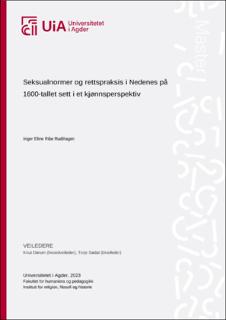Seksualnormer og rettspraksis i Nedenes på 1600-tallet sett i et kjønnsperspektiv.
Master thesis
Permanent lenke
https://hdl.handle.net/11250/3078657Utgivelsesdato
2023Metadata
Vis full innførselSamlinger
Sammendrag
The theme for this dissertation is the townspeople of the county Nedenes’ norms regarding sexuality compared to the new laws and criminalisation in the 17th century Norway. In both the norms and the laws sexuality belonged within marriage. However, there were differences regarding when the marriage was viewed as valid, and the cohabitation acceptable. Previous research in this field consists of the works of Terje Sødal and Margit Løyland have both written about criminality in Agder during the 1600s, but they have chosen shorter periods of time in the beginning, middle and end of the century. I have transcribed and analysed all the lists of fines (Sakfallslister) in the country accounts (lens- og fogderegnskaper) from 1600-1700 in Nedenes. This will be my main source. Since sexual crimes is an area within the judicial system where the parties involved usually consisted of a male and a female, a gender perspective will be used to compare the norms and judicial practices based on the difference in gender. Other than the gender perspective I will be using the theoretical approach of criminalisation and juridification, which both are processes where the judicial system to a larger extent executes punishments as described in the laws, and the judicial system is more defined regarding roles. Furthermore, the perspectives of the state as either forcing its population into order or interacting with and compromising with the people will be applied to the Danish-Norwegian states’ development.
I was able to locate a short time period from when women were legally responsible for pre-marital intercourse in 1617 (without a following wedding) where women were held accountable for these actions in court. This differs from previous research which shows that no women were punished for this crime until 1650 in Norway. In addition, there is a transition from mostly men being punished for pre-marital intercourse in the first half of the 1600s, to mostly women being punished in the last half of the century. Furthermore, the state also tried to abolish the element of private agreement between families regarding marriage and make the officiation in the church the main element of the marriage process. In Nedenes more people were convicted for starting the cohabitation before the church ceremony, which shows that the norms of the people stayed the same despite the new laws. These findings confirm that the state of Denmark-Norway in the 17th century both forcefully pushed through changes via the new laws and negotiated on the basis of customs.
